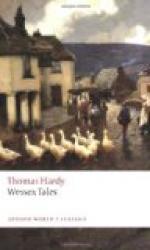Mr. Marchmill was in a thriving way of business, and he and his family lived in a large new house, which stood in rather extensive grounds a few miles outside the city wherein he carried on his trade. Ella’s life was lonely here, as the suburban life is apt to be, particularly at certain seasons; and she had ample time to indulge her taste for lyric and elegiac composition. She had hardly got back when she encountered a piece by Robert Trewe in the new number of her favourite magazine, which must have been written almost immediately before her visit to Solentsea, for it contained the very couplet she had seen pencilled on the wallpaper by the bed, and Mrs. Hooper had declared to be recent. Ella could resist no longer, but seizing a pen impulsively, wrote to him as a brother-poet, using the name of John Ivy, congratulating him in her letter on his triumphant executions in metre and rhythm of thoughts that moved his soul, as compared with her own brow-beaten efforts in the same pathetic trade.
To this address there came a response in a few days, little as she had dared to hope for it—a civil and brief note, in which the young poet stated that, though he was not well acquainted with Mr. Ivy’s verse, he recalled the name as being one he had seen attached to some very promising pieces; that he was glad to gain Mr. Ivy’s acquaintance by letter, and should certainly look with much interest for his productions in the future.
There must have been something juvenile or timid in her own epistle, as one ostensibly coming from a man, she declared to herself; for Trewe quite adopted the tone of an elder and superior in this reply. But what did it matter? he had replied; he had written to her with his own hand from that very room she knew so well, for he was now back again in his quarters.
The correspondence thus begun was continued for two months or more, Ella Marchmill sending him from time to time some that she considered to be the best of her pieces, which he very kindly accepted, though he did not say he sedulously read them, nor did he send her any of his own in return. Ella would have been more hurt at this than she was if she had not known that Trewe laboured under the impression that she was one of his own sex.
Yet the situation was unsatisfactory. A flattering little voice told her that, were he only to see her, matters would be otherwise. No doubt she would have helped on this by making a frank confession of womanhood, to begin with, if something had not happened, to her delight, to render it unnecessary. A friend of her husband’s, the editor of the most important newspaper in the city and county, who was dining with them one day, observed during their conversation about the poet that his (the editor’s) brother the landscape-painter was a friend of Mr. Trewe’s, and that the two men were at that very moment in Wales together.




